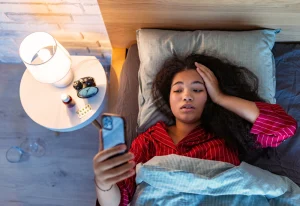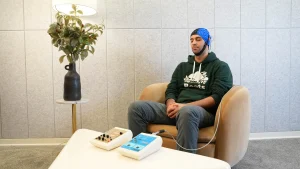What is Anxiety?
Anxiety is a state of concern, trepidation, or discomfort over a situation whose conclusion is unclear. Although it is a common and generally positive feeling, for some people it may become overwhelming. When it becomes overwhelming, both a person’s daily life and mental health can be significantly affected as it turns into a negative factor when it manifests itself excessively and interferes with daily living. While on the other hand, Anxiety may be advantageous since it prompts people to take protective measures and acts as a warning sign for future risks. Anxiety, for example, might spur someone to study more and prepare more fully before a big exam. Additionally, anxiety might assist people in avoiding hazardous or dangerous circumstances. In certain circumstances, such as in the arts, where it may be harnessed to produce potent and evocative works, anxiety can also be a sign of increased emotional sensitivity. This can be a beneficial quality.
There are many different causes of anxiety, both hereditary and environmental. Among the root causes of anxiety are:
- Anxiety disorders may run in families, which raises the possibility that there is a genetic component to how they develop.
- Anxiety can be brought on by traumatic experiences like physical or emotional abuse, serious accidents or illnesses, or the death of a loved one.
- Anxiety can be influenced by imbalances in the amounts of specific brain chemicals like serotonin and GABA.
- Anxiety symptoms can be brought on by chronic ailments including heart disease, thyroid issues, and persistent pain.
- Abuse of drugs or alcohol can make anxiety symptoms worse.
- Stressful life events like starting a new job, moving, or having a kid could be a big cause of anxiety and stress.
- Stress and anxiety can also be brought on by exposure to pollutants, poisons, or extremely high or low temperatures.
There are several methods for treating stress and anxiety, including medications like antidepressants and anti-anxiety as well as therapies including cognitive behavioral therapy, behavioral therapy, exposure therapy, etc. Changes in daily routine, self-care, mindfulness, and regular exercise are further strategies. Another crucial method of reducing stress and anxiety is through talking to your support systems, such as your friends and family.

The Next Big Thing in Anxiety
The next great breakthrough in anxiety research and therapy is hard to foresee since it is a discipline that is continually changing. There is continuous research in the area of anxiety, and there are a number of innovative technologies and therapies that are being researched and might one day be the “NEXT BIG THING.” Several instances include:
Digital Therapies
Digital therapies, sometimes referred to as e-therapies or e-mental health, offer evidence-based treatments for anxiety and stress using technology such as mobile applications, websites, and online programs. To better control stress and anxiety, these therapies can be used with more conventional therapies like counseling and medication.
Some of these therapies are:
- Cognitive behavioral therapy apps: These applications offer interactive activities, resources, and techniques built on the foundation of CBT. They can aid users in recognizing and combating negative thoughts, altering harmful habits, and enhancing coping mechanisms.
- Mindfulness and Meditation apps: To assist users in lowering stress and anxiety, these applications include guided meditations, mindfulness exercises, and relaxation techniques. The practice of mindfulness is thought to be extremely safe, and it has a strong probability of boosting your sense of well-being and serenity while lowering your levels of stress, anxiety, and sadness.
- Self-help programs: To assist users in better understanding and managing their anxiety, these applications and websites provide them with support, tools, and information. To assist users in identifying triggers and creating coping mechanisms, they may incorporate instructional resources, tests, and self-assessment.
A growing number of people are turning to digital therapies for mental health because of how convenient, easy to obtain, and adaptable they are. They are convenient to use at any time, in the convenience of one’s own home, and are simple to include into a person’s daily routine. Additionally, they can offer privacy and lessen the stigma attached to obtaining treatment for mental health problems.
When patients, such as those who live in remote regions or have mobility problems, find it difficult to get standard mental health care, digital therapies might be very helpful. They can also be a more affordable and convenient therapeutic option than conventional therapy because they don’t need a therapist to be physically there.
IV Nutrient therapy
Intravenous (IV) nutrient therapy is a medical treatment in which vitamins, minerals, and other nutrients are delivered directly into the bloodstream through a vein. The goal of IV nutrition treatment is to deliver a significant amount of vital nutrients that can support a range of biological processes and perhaps enhance medical and mental conditions. Numerous IV nutritional therapies, such as Myers’ cocktail and high-dose vitamin C, have been used to treat illnesses like infections, tiredness, anxiety, and headaches.
The theory behind IV nutrition treatment is that by putting large amounts of vital nutrients right into the bloodstream, the body will be able to absorb and use them more readily, perhaps improving health. For instance, some health professionals think that IV nutrition treatment can improve immune function, lower inflammation, and increase energy levels.
There is continuous scientific discussion and investigation over the efficacy of intravenous (IV) nutrition therapy for the treatment of anxiety. According to several research, vitamins, and minerals, among other nutrients, may help reduce the symptoms of anxiety. To ascertain the safety and efficacy of IV nutrition treatment, additional study is required as the science underlying it is still in its infancy.
Nutraceuticals
Nutraceuticals are a class of food that have health and medical advantages, including the ability to prevent and treat illness. They come from naturally occurring foods including fruits, vegetables, cereals, and other foods, and are frequently processed or fortified with extra nutrients and other active components to offer certain health advantages. Vitamins, minerals, probiotics, antioxidants, and Omega-3 fatty acids are a few examples of nutraceuticals. To improve general health and well-being, they are frequently utilized as dietary supplements.
Numerous research has been done on nutraceuticals and their potential advantages for treating different medical disorders, including anxiety. Anxiety symptoms may be improved by omega-3 fatty acids, according to one study, while magnesium supplementation has been linked to lower anxiety levels in certain people, according to another.
Probiotic studies have also demonstrated encouraging findings for lowering anxiety, although further study is required to completely comprehend the processes underlying this potential benefit.
Functional Medicine
Functional medicine is a comprehensive approach to healthcare that emphasizes finding and treating a disease’s underlying causes as opposed to only treating its symptoms. To identify the underlying causes of a patient’s health problem, a thorough assessment of their physical, emotional, environmental, and lifestyle aspects is required.
Practitioners of functional medicine collaborate with patients to create individualized treatment schedules that take into account each person’s particular requirements and objectives. This strategy frequently combines conventional therapies with complementary ones, including lifestyle adjustments, dietary and nutritional adjustments, dietary supplements, and functional medical tests.
Although functional medicine has been practiced for many years and has proven successful in treating a number of chronic illnesses like diabetes, heart disease, and autoimmune disorders, etc, treating anxiety with this strategy is still relatively new.
Instead of only treating a condition’s symptoms, the functional medicine approach to healthcare stresses the significance of locating and resolving the condition’s core cause. Due to the fact that many people who experience anxiety may have underlying imbalances or deficiencies that contribute to their symptoms, this method is becoming more and more common for the management of anxiety.
Neurofeedback
Real-time displays of brain activity are used in neurofeedback, a type of biofeedback, to assist people to control their brain function and enhance their mental and physical well-being. Typically, neurofeedback uses sensors put on the scalp to detect brain electrical activity, which is then shown in real time on a screen.
Neurofeedback aims to teach people how to regulate their brain activity by, for example, decreasing activity in hyperactive brain areas and enhancing activity in underactive brain regions.
In certain studies, neurofeedback has been investigated as a potential anxiety treatment and has shown a promising future. Studies have demonstrated that neurofeedback can reduce feelings of anxiety by teaching people how to control their own brain activity.
Sensors are positioned on the scalp to detect electrical activity in the brain during neurofeedback for stress and anxiety. The resultant information is utilized to provide people with immediate feedback on their brain activity, enabling them to observe when their brain is calm and relaxed and when it is more stimulated and anxious.
Neurofeedback can assist people with stress and anxiety by helping them control their physiological reactions, elevate their mood, and lessen their stress levels.
Over the years, various research has explored the use of neurofeedback for anxiety and other mental health issues. Some people still view it as an experimental treatment, but the existing evidence indicates that it may be a viable choice. To fully understand its efficacy and identify the people who are most likely to profit from this strategy, additional study is undertaken.
Biofeedback
A method called biofeedback includes measuring physiological processes with a variety of sensors and then giving people immediate feedback on those processes. The purpose of biofeedback is to assist people in bettering their health and well-being by teaching them how to control and become more conscious of their physiological reactions. Heart rate, muscular tension, skin temperature, and brain activity are just a few of the physiological processes that people may utilize biofeedback to control.
People with stress and anxiety can also use biofeedback to control and manage some physical reactions linked to anxiety. Utilizing tools that gauge physiological reactions like heart rate, skin conductance, or muscular tension is usual. The person is trained to alter their reactions using methods like relaxation, deep breathing, or visualization. These measures are shown on a screen in real time. The intention is for the person to gradually gain more self-awareness and control over their physiological reactions, which will lessen the symptoms of anxiety.
It’s not new to use biofeedback as a stress and anxiety treatment. The earliest research evaluating the use of biofeedback for various disorders dates back to the 1960s and 1970s, and additional studies examining its efficacy have since been conducted.
Although some people still view biofeedback as an experimental treatment for stress and anxiety, the existing evidence indicates that it has promise as a therapeutic choice which is encouraging researchers to study more on it more.
Conclusion
The development of non-pharmacological treatments, such as mindfulness-based therapies, NUTRACEUTICALS, neurofeedback, etc., is receiving more attention as people become more aware of the possible adverse effects of the long-term use of anxiety drugs. There is a lot of evidence-based research being done on anxiety and its treatment, and the results look pretty promising because these methods might assist much more effectively To assist people to manage and conquer their anxiety, it is important to continue developing safe and efficient therapies.
Elumind Centres for Brain Excellence is an integrated mental health centre offering solutions that can help you with your mental/brain health needs. To start your journey, book your FREE 15-MINUTE PHONE CONSULTATION. We are here for you.








